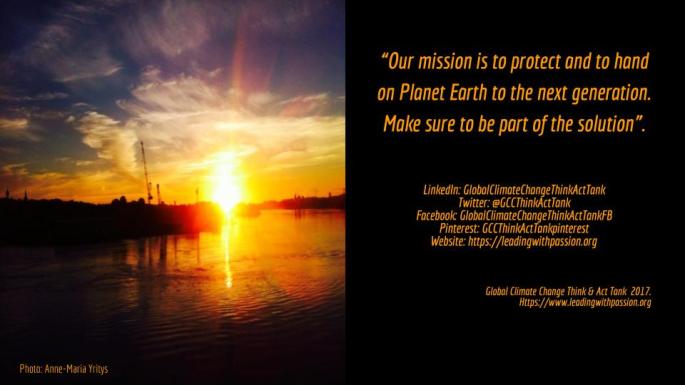100% renewable energy is not a dream. It is reality. ~ The Climate Reality Project
#GCC @GCCThinkActTank


100% renewable energy is not a dream. It is reality. ~ The Climate Reality Project
#GCC @GCCThinkActTank

Global Finland, communication unit for development of the Ministry for Foreign Affairs of Finland, arranged a summer school day in Pori on July 16th, 2014.
Pori Theatre
Agenda of the day:
10-10:15 a.m. Opening
Minister for International Development Pekka Haavisto and rap artist Signmark
10:15-11:15 a.m. Can Climate Catastrophe Be Avoided?
Rachel Kyte, The World Bank
Jukka Uosukainen, UNEP
Kaisa Kosunen, Greenpeace
11:20-12:00 Workshops
1) Why is democracy needed? Demo
2) Human rights and taxes in developing countries – The ABC of CSR (Corporate Social Responsibility). SASK and FinnWatch.
3) The World Post 2015. UNA of Finland and UN Youth of Finland.
12:00-13:00 Lunch
13:00-13:25 A World of Conflicts – Is Peace a Utopian Dream?
Minister for International Development Pekka Haavisto
13:30-14:45 Workshops
1) Somalia/Finn Church Aid actalliance
2) Syria and exile/Red Cross Finland
3) Middle East/CMI (Crisis Management Initiative/Martti Ahtisaari Centre)
15:00-16:30 New Challenges of Finland´s Foreign Policy
Minister for Foreign Affairs Erkki Tuomioja,
Minister for International Development Pekka Haavisto,
Minister for European Affairs and Foreign Trade Leena Toivakka, and
Researcher Hiski Haukkala. The discussion was lead by Press Counsellor Leena Brandt.
Can Climate Catastrophe Be Avoided?
Notes taken based upon the discussion:
– In terms of Climate Technology, a positive signal is that technologies are available, although we are running out of time.
– The public sectors and governments must take the initiative, but of course also the private sector and corporations need to take action.
– A New Green Economy (renewable energy sources) is emerging, and the time of negotiations is hectic at the UNEP which is also serving developing countries, and (thanks to which) whole new bodies have been found in order to accelerate development.
– Implementation must be taken care of quickly, all over the world, since we are running out of time.
– Climate change has to be fought against in order to assure prosperity for everyone.
– In the past 20 years, remarkable improvements have been made in terms of pollution control (see e.g. OzonAction Programme).
– Incentives must be taken in the economy, both on macro and micro levels. Currently not even the G20 discuss the topic enough. The IMF and finance ministers of the world do discuss to some extent, although not enough.
– NGO ́s need to create change and pressure.
– The coal boom of China is coming to an end faster than thought since people understand their need of clean air.
– The trends of alternative energy sources are amazing, and costs are coming down fast. The amount of wind energy worldwide has tripled in a short period of time, and solar energy is now used tenfold.
– Paris 2015 deal? => End of fossil fuel era? The breakthrough of renewables is now unstoppable.
– Consumers can create pressure by expressing their opinions, and providing politicians with constructive feedback. Networks can be helpful when communicating needs. There are many ways of influencing.
– There are many new faces in the climate scene throughout societies.
– Change can be made visible through education. Long-term decisions need to be made NOW. Children can also teach their parents e.g. in terms of recycling. Students change their own schools and universities through demanding renewables.
– Correct choices must be made in politics, although e.g. in Finland there are not so many environmentalists in the parliament. However, more and more climate groups exist on a national level and people are more busy acting than debating.
– EU 2030: More radical actions needed.
– Business coalitions (e.g. Richard Branson ́s coalition of companies).
Pori, Finland.
You must be logged in to post a comment.